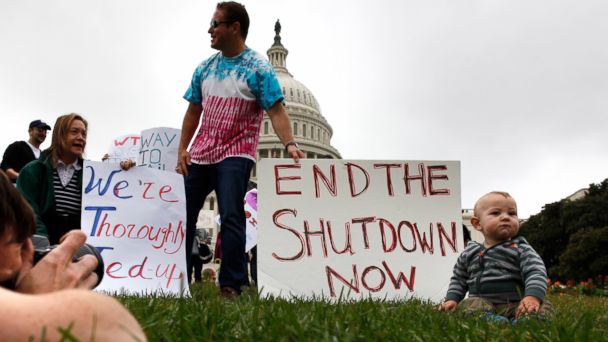Senate Leaders 'Optimistic,' But No Shutdown-Ending Deal Yet

(Credit: Jonathan Ernst /REUTERS)
WASHINGTON - Senate Majority Leader Harry Reid said he was "optimistic" about the prospects of the Senate striking a deal to end the government shutdown and avert a default, but at least two major sticking points remain and it is still not clear whether any Senate deal would win approval in the House.
Senate Majority Leader Harry Reid and Senate Minority Leader Mitch McConnell, the two men charged with finding a way to end the government shutdown and increase the country's borrowing ability, spoke today by phone.
"I have had a productive conversation with the Republican leader this afternoon. Our discussions were substantive and we'll continue those discussions," Reid said on the Senate floor. "I'm optimistic about the prospects for a positive conclusion to the issues before this country today."
The two leaders have not met face to face to negotiate the terms of a deal since their morning meeting Saturday with Sen. Chuck Schumer, D-N.Y., and Lamar Alexander, R-Tenn.
The main sticking point in negotiations is how to handle sequestration cuts, Democratic senators said today. Reid has agreed to a continuing resolution lasting until Nov. 15 under the current spending level of $986 billion, but a new round of sequestration cuts will go into effect on Jan. 15, 2014, trimming an additional $21 billion from the budget.
McConnell released a statement today implicitly supporting a plan crafted by Sen. Susan Collins, R-Maine, that Democrats shot down Saturday.
"There is a bipartisan plan in place that has the support of Democrat and Republican Senators. It would reopen the government, prevent a default, provide the opportunity for additional budget negotiations around Washington's long-term debt, and maintain the commitment that Congress made to reduce Washington spending through the Budget Control Act - the law of the land," McConnell said. "It does all this while maintaining our commitments to reduce spending, cutting an Obamacare tax and improving anti-fraud provisions in the law. It's time for Democrat leaders to take 'yes' for an answer."
But the six Democratic senators who worked with Collins on her proposal said they do not support the plan as it stands.
"We have been involved in productive, bipartisan discussions with Senator Collins and other Republican senators, but we do not support the proposal in its current form. There are negotiations, but there is no agreement," Sens. Heidi Heitkamp, D-N.D.; Mark Pryor, D-Ark.; Amy Klobuchar, D-Minn.; Angus King, I-Maine; Joe Donnelly, D-Ind.; and Joe Manchin, D-W.V.; said in a statement.
The initial framework of the Collins plan lifts the debt limit until Jan. 31, 2014 and reopens the government for six months while also delaying the medical device tax for two years and requiring income verification for insurance exchanges. However, Democrats want both the continuing resolution and debt ceiling extended for longer periods of time.
But as Congress remained at an impasse, anger boiled over as hundreds of veterans and protesters descended upon the National Mall to demand that the national war memorials be fully reopened. The veterans, part of the Million Vets March, linked up with former GOP vice presidential candidate Sarah Palin, and Republican senators Ted Cruz of Texas and Mike Lee of Utah, at the World War II Memorial.
"Let me ask a simple question, why is the federal government spending money to erect barricades to keep veterans out of this memorial?" Cruz said. "Our veterans should be above all this."
Protesters removed barriers at the World War II Memorial and Lincoln Memorial and stacked them up outside the White House gates.
"You work for us! You work for us!" the veterans chanted.
At the White House, President Obama spoke with House Minority Leader Nancy Pelosi by phone to discuss "the way forward on the pressing fiscal matters facing Congress today."
Even if the Senate reaches an agreement on how to end the government shutdown and increase the country's borrowing authority, it remains unclear whether the House would ever agree to the Senate's plan.
"We're in a free-fall as Republicans, but Democrats are not far behind," Sen. Lindsey Graham, R-S.C., said on ABC News' "This Week."